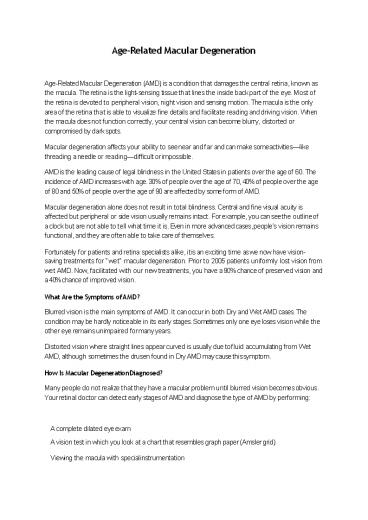Age-Related Macular Degeneration - PowerPoint PPT Presentation
Title:
Age-Related Macular Degeneration
Description:
Age-Related Macular Degeneration (AMD) is a condition that damages the central retina, known as the macula. The retina is the light-sensing tissue that lines the inside back part of the eye. To know more about Age-Related Macular Degeneration and its treatment, read the complete article or visit website . – PowerPoint PPT presentation
Number of Views:43
Title: Age-Related Macular Degeneration
1
Age-Related Macular Degeneration
Age-Related Macular Degeneration (AMD) is a
condition that damages the central retina, known
as the macula. The retina is the light-sensing
tissue that lines the inside back part of the
eye. Most of the retina is devoted to peripheral
vision, night vision and sensing motion. The
macula is the only area of the retina that is
able to visualize fine details and facilitate
reading and driving vision. When the macula does
not function correctly, your central vision can
become blurry, distorted or compromised by dark
spots. Macular degeneration affects your ability
to see near and far and can make some
activitieslike threading a needle or
readingdifficult or impossible. AMD is the
leading cause of legal blindness in the United
States in patients over the age of 60. The
incidence of AMD increases with age. 30 of
people over the age of 70, 40 of people over the
age of 80 and 50 of people over the age of 90
are affected by some form of AMD. Macular
degeneration alone does not result in total
blindness. Central and fine visual acuity is
affected but peripheral or side vision usually
remains intact. For example, you can see the
outline of a clock but are not able to tell what
time it is. Even in more advanced cases, peoples
vision remains functional, and they are often
able to take care of themselves. Fortunately for
patients and retina specialists alike, it is an
exciting time as we now have vision- saving
treatments for wet macular degeneration. Prior
to 2005 patients uniformly lost vision from wet
AMD. Now, facilitated with our new treatments,
you have a 90 chance of preserved vision and a
40 chance of improved vision. What Are the
Symptoms of AMD? Blurred vision is the main
symptoms of AMD. It can occur in both Dry and Wet
AMD cases. The condition may be hardly
noticeable in its early stages. Sometimes only
one eye loses vision while the other eye remains
unimpaired for many years. Distorted vision where
straight lines appear curved is usually due to
fluid accumulating from Wet AMD, although
sometimes the drusen found in Dry AMD may cause
this symptom. How Is Macular Degeneration
Diagnosed? Many people do not realize that they
have a macular problem until blurred vision
becomes obvious. Your retinal doctor can detect
early stages of AMD and diagnose the type of AMD
by performing
A complete dilated eye exam A vision test in
which you look at a chart that resembles graph
paper (Amsler grid) Viewing the macula with
special instrumentation
2
Optical Coherence Tomography (OCT) Tests the
macular anatomy at the microscopic level
Non-invasive imaging technique Quantifies
swelling in the macula and determine the
effectiveness of treatment Fluorescein
Angiography (FA) Tests the retinal circulation to
identify the abnormal blood vessels and diagnose
Wet AMD Vegetable-based dye is injected into
your arm and photos of your retina are taken.
How Is Macular Degeneration Treated? Presently
there is no cure for AMD. Your doctor may
recommend observation if there is no evidence of
active Wet AMD. Nutritional Supplements Although
the exact causes of macular degeneration are not
fully understood, antioxidant vitamins and zinc
may reduce the impact of AMD in some people. In
the Age-Related Disease Study II (AREDS II),
taking a high dose combination of vitamin C,
vitamin E, lutein, zeaxanthin, zinc, and copper
was found to reduce the risk of progression of
high-risk Dry AMD. This group of high-risk dry
AMD patients has significant drusen and pigment
under the macula, which can be identified by your
doctor. The AREDS vitamins, however, are not
recommended for smokers due to an increased risk
of lung cancer. Other specific formulations are
available to this population. You should speak
with your doctor to determine if you are at risk
for developing advanced AMD, and to learn if
supplements are recommended for
you. Intraocular Injections Injections are the
standard of treatment for patients with Wet AMD.
As mentioned above, multiple clinical trials
have shown that intraocular injections can
improve vision in 40 of patients and stabilize
vision in 90 of those treated. Typically
patients require injections every four to six
weeks until the blood vessels and leakage are
brought under control. Maintenance injections may
also be needed at different intervals. The goal
is to optimize vision and control leakage.
Patient response can be quite variable so that
some patients may only require two or three
injections over a two year period to control
their Wet AMD, while others require monthly
injections to adequately control the leakage and
maintain their vision. Your retinal doctor will
tailor your treatment, ensuring you receive the
best visual result possible.
3
Laser Surgery and Photodynamic Therapy
(PDT) Laser surgery is occasionally used to
complement treatment with intraocular injections.
Traditional hot laser is used less frequently
but is an option for some patients. Many clinical
studies have shown that for some patients, PDT,
or cold laser, can diminish the number and
frequency of injections to control leakage.
Patients undergoing PDT need to avoid direct sun
exposure for two days following the PDT
procedure for AMD. Retina Specialty Institute
expertise in retinal hole laser treatment in The
Villages, FL and involved in multiple clinical
trials, including studies involving AMD. Your
retinal surgeon or their staff can answer any
questions you may have concerning AMD. Article
Source https//www.retinaspecialty.com/age-relate
d-macular-degeneration.html































